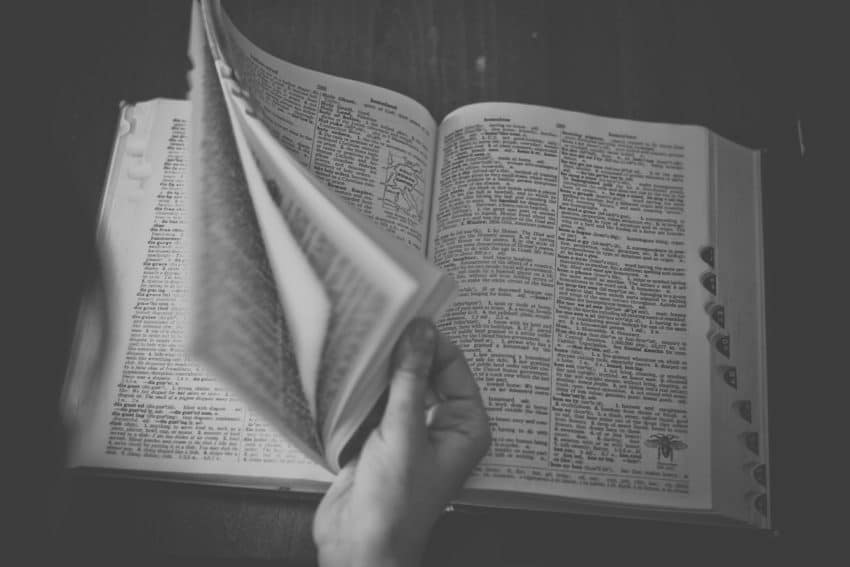Content Writing Tips: Use a Thesaurus

Content writing tips your high school English teacher will love
If you haven’t used a thesaurus since high school, you’re doing content marketing all wrong. Writing great content means having a solid technique. You don’t want to get repetitive, and you don’t want to bore your audience with stale phrases or ideas. I also wouldn’t recommend using antiquated or phD-level words to avoid alienating your audience. This is where using your trusty, old thesaurus comes in as one of the best content writing tips.
Say it one more time
You use thesauruses to find synonyms. But why is this so important when you’re working in content marketing? Because often times, you need to say the same thing repeatedly to drive home a point. I’m not advocating four pages of content where you rewrite the same sentence every way imaginable, but I do believe that reiterating your message is powerful. The same words don’t resonate with everyone. So you need to tweak the words you’re using as well as your phrasing to make sure your message is clear. This will also helps with SEO, as you can broaden your keyword phrases.
It’s important that when you rewrite a sentence for use in another part of the same content, you don’t just change a word or two. Switch to passive voice, or start with an action verb this time. The synonyms found in your thesaurus assist you propping up these new sentences so they’re completely fresh.
Avoid reusing words
It’s just plain ugly to see the same word used over and over again. It sounds wrong. When you see it on the page, it’s unappealing. Hearing it is even worse. Please, stop doing this.
If you find you keep reusing the same word repeatedly, go to your thesaurus. You can change this:
- “Use a thesaurus in your content marketing plan. Content is important to your overall digital marketing plan, as your plan needs to educate your leads. Create an actionable plan that you can execute”
To this:
- “Use a thesaurus in your content marketing plan. Content is important to your overall digital marketing campaign, as your strategy needs to educate your leads. Create an actionable procedure that you can execute”
That second version reads a little better, doesn’t it?
However, it’s important to note when repetition is used purposely. For instance, you may choose to start three sentences in a row in the same exact way. This is a creative choice you might make because of how you want your audience to read your content. Recognize the difference between reusing a word accidentally, and creating interesting meaning with repetition.
Antonyms
Sometimes you know exactly what you don’t want to say. That’s where antonyms come in.
Antonyms are particularly great for showing contrast between your solution and your problem. Using words that are foils to one another within the same sentence reinforce your company’s offering. Let the reader see an audience with and without your solution—and use complementary but contrary words to illustrate your meaning.
Cliche-buster
You can lead a horse to water, but please don’t make it use those tired idioms ever again. Make it a habit to break from those cliches and start using your thesaurus. It’s fine to sprinkle a common phrase here and there if it really fits. Comb through this post and you’ll see I’m partial to a few adages. But don’t make cliches the backbone of your content.
If you’re prone to including colloquialisms in your content, write your first draft and highlight all of the idioms or common phrases you use. Get them out of your system. Now, go back through and use your thesaurus to find similar words that convey the same meaning. You can often boil down a cliche to one word. Take “boil down” for instance. Instead of saying that, I could have said “simplify” or “compress.” Now, I can look for other words in my thesaurus that best match my original meaning. You won’t always find a better match. But eliminating these hackneyed terms from the majority of your writing is better than accepting that they’re a part of your work.
Inspiration
Finally, thesauruses are necessary for inspiration. If you’re working on overall messaging for your brand, you might be stumped. Choose a few core words that you already associate with your brand. Now, run these words through a thesaurus. While this won’t work with every word, it will help you paint a picture of exactly how much you can say about your brand without stretching yourself. We think of these words as a “keyword universe” in PPC. These words are part of your core content marketing world. They describe your brand, your solution, and your target audience. And you can thank your thesaurus for that.
Reach out to DemandZEN today to learn more of their content writing tips.
You Might Also Enjoy These Posts
Demand Generation vs Lead Generation
Gamification Strategies: Badges in B2B Marketing
Welcome To DemandZEN
DemandZEN specializes in Account-Based Demand Generation and solving the challenges around finding, engaging and converting target accounts into real opportunities for B2B Technology and Services companies.



